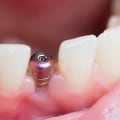Decreased sense of smell; sinus headaches · toothache · bad breath; high temperature. As with any tooth, it's excessive. As with any tooth, excessive force or impact can cause a dental implant to crack or loosen. Although rare, the jaw may reject a dental implant.
Smoking, poor oral hygiene, uncontrolled diabetes, and certain medications can increase the risk of implant rejection. If an implant is rejected, it will need to be removed. After healing and addressing any underlying problems, replacement implants can often still be successfully placed. This is a common nervous habit that's hard to break. In addition to introducing harmful bacteria into the body, nail biting can have negative effects on dental health.
One of your teeth could be accidentally chipped or an implant could be damaged. When your jaw is in a prominent position, you are putting pressure on it. You may also tear or damage your gums. To break this habit, try taking steps to reduce stress, applying bitter nail polish, or investing in a manicure. You are expected to experience some level of pain and discomfort after dental implant surgery when the effect of the anesthesia wears off.
The intensity of the pain may vary from person to person, but it is usually described as mild to moderate. The pain peaks 48 to 72 hours after surgery and gradually subsides. However, severe pain should not occur or persist longer than expected. You should contact your dentist right away if you experience severe or prolonged pain.
A person should floss the area at least once a day after the gums have healed and use interdental brushes to access the most difficult to reach areas. Dental implants are custom-made replacements for tooth roots made with titanium posts that are surgically placed in the jaw. However, if pain and swelling persist longer than a week, the person should schedule a follow-up appointment with the dentist. Of the 3% of dental implants that fail, many are due to medical conditions such as uncontrolled diabetes or excessive smoking.
Dental implants are a good solution for people who are replacing teeth damaged by tooth decay or serious trauma. In fact, this is true in the short term, including surgery, components and the final manufacture of the crown, a dental implant can often cost around 2000 British pounds. In short, while dental implants provide a long-term solution for missing teeth, the initial investment may be significantly greater than other options. Implant failure occurs when the dental implant does not integrate properly with the jaw or if it loses stability after being initially successful.
Once the dental implant is placed, stitches will most likely be placed on it, so you should be sure to be careful after the implants are placed. Dental implant surgery involves trauma to the gums and jaw, but the procedure itself is usually performed with local anaesthesia, which numbs the nerves surrounding the dental implant area. However, if you experience severe pain or prolonged discomfort, it is recommended that you contact your dentist right away. Patients with uncontrolled diabetes, osteoporosis, or certain autoimmune diseases may not be ideal candidates for dental implants.
The placement of dental implants involves a surgical procedure in which the implant is securely embedded in the jaw. While dental implant surgery (DIS) has a high success rate and may be good for some people, it's not right for everyone. While dental implants can provide an excellent solution for missing teeth, patients should start the procedure with realistic expectations about the recovery process, timelines, costs, and potential risks involved. In addition, your dentist will continuously monitor your comfort throughout the surgery and will adjust the level of sedation if necessary to ensure a smooth and painless experience.



